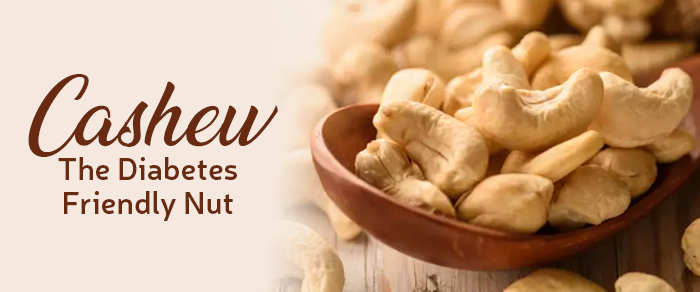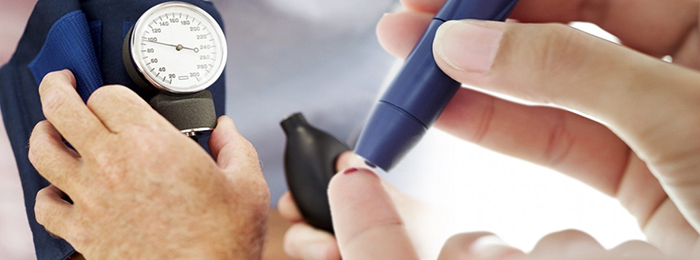The Role of Nuts in Diabetic Diet
Lifestyle and a healthy diet play a significant role in maintaining one’s complete health issues. A healthy diet is one of the most important ways by which an individual with diabetes can control his/her blood sugar levels, thereby reducing the risk of complications.
It also helps in managing cholesterol levels, blood pressure and maintaining correct body weight. Nuts are a good source of protein and good fats, which can be incorporated into a healthy diet.
Myths and Misconceptionsabout Cashew Nuts:
People with diabetes and other chronic illnesses are often afraid to eat nuts, mainly due to the belief that these nuts can increase cholesterol levels. There is also a misconception that eating nuts increases body weight as they are high in fat and therefore energy-dense.
But in reality, nuts are a very good source of nutrition and provide a good range of health benefits. Almonds, walnuts, pistachios, peanuts and cashew nuts are the commonly consumed nuts.
Nuts are one of several foods that the American Diabetes Association found to be most beneficial for people with several conditions and illnesses. The high quantities of unsaturated fats present in nuts fulfil a range of important functions, such as aiding in cell growth and protecting organs, including the heart. Hence, they are one of the best nuts for a diabetic diet.
Is The Cashew Nut Good for Diabetic Individuals?
Recent research has shown that cashews are better than other nuts for people with diabetes and thatcashew nut extract has anti-diabetic properties too. Although it has relatively high-fat content, most of this is “good fat” which is healthy for diabetes patients. Cashews have an ideal fat ratio of 1:2:1 of saturated, monosaturated, and polyunsaturated fat.
By this ratio, cashew nuts are found to be “low fat” nuts, and contain less fat per serving than many other popular nuts including almonds, walnuts, peanutsand pecans. Cashew nuts are high in dietary fiber, which can also help in supporting weight loss and weight management.
In Indian cuisine, cashew nuts are generally used as whole nuts, or in paste or powder form for curries and sweets. Cashew nuts contain high levels of beneficial fats, the consumption of which can raise the good cholesterol and reduce the bad cholesterol levels, and thereby reduce the risk of heart disease. Undoubtedly, they are one of the best nuts for diabetes.
Better Replacement for Carbohydrate Foods:
Also, by replacing polished rice and maida in the diet at least partially with these nuts, one can reduce the intake of refined carbohydrates and thereby minimize the risk of developing type 2 diabetes. While there have been many studies on the benefits of other nuts for diabetes such as almonds and pistachios, there was, until recently, no such data available for cashew nuts, which are widely used and easily available in India.
Finally, the Best Nut for Controlling Diabetes hasbeen Revealed
In case you’re still wondering- Is the cashew nut good for diabetic individuals?, look no further. Recently, a study was conducted by the research team at Dr. Mohan’s Diabetes Specialitiescentre and Madras Diabetes Research Foundation to evaluate the potential effect of consumption of cashews on blood sugars, cholesterol, blood pressure, and body weight. In this study, 150 people with diabetes were given 30g of unsalted, raw, broken cashew nuts daily for 12 weeks, while maintaining the prescribed diabetic diet and refraining from eating any other nuts. Blood pressure, blood sugars, cholesterol levels, body weight, and height were checked before and at the end of the study.
To our surprise, it was found that there was a significant increase in good cholesterol levels and a decrease in blood pressure following intake of raw cashew nuts for 12 weeks. The study also showed that cashew nuts did not increase blood sugars, body weight or waist size when consumed in moderate amounts. Therefore, we suggest that cashews can be included in a healthy diet for the prevention of obesity and heart disease. It is one of the best nuts for diabetes.
Goodness and Health Benefits of consuming Unsalted and Raw Cashews:
In addition to good fats, cashews contain a good amount of Arginine, an amino acid that can reduce blood pressure. They are also rich in copper, magnesium and zinc, nutrients that are considered good antioxidants and help in improving the immune system and nervous system.
Cashew is also rich in Oleic acid which is responsible for lowering bad fat in your blood. It has been found that about 75 percent of the fat in cashews is oleic acid, which also termed as heart-healthy monounsaturated fat, that is the same type of fat found in olive oil. When this monounsaturated fat is incorporated into your diet instead of refined carbohydrate foods, it helps reduce high triglyceride, or blood fat, levels. When calories from carbohydrate are replaced by monounsaturated fat such as that found in cashews, it helps to reduce the blood sugar levels as well.
Also. cashews can provide 100% of the recommended daily intake of copper, an important mineral that is otherwise difficult for vegetarians to obtain in their diet. Cashews are safe to eat raw and are easily available in India.
Disclaimer: Cashews – The Diabetes-Friendly Nut
To conclude, cashews are extremely healthy as they are a powerhouse of vitamins and minerals. Hence, it is the time for us to discard the old beliefs and include cashew nuts among the nuts in a diabetic diet and in the diet of people with heart diseases, and high blood pressure. But moderation is the key. Also, please remember that the health benefits noted above apply only to raw unsalted nuts and may not persist if the cashew nuts are salted, fried, or otherwise cooked.
=============================================================
Meta Title- Are Cashews a Healthy Nut For Diabetes? | Dr. Mohan’s
Meta description- It is proven that the cashew nut is one of the best nuts for diabetes. It helps increase good cholesterol & reduces blood pressure. Click to learn more.




